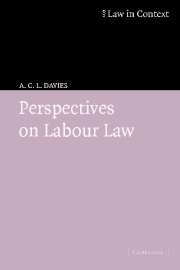Book contents
- Frontmatter
- Contents
- Preface
- Acknowledgements
- Table of statutes
- Table of statutory instruments
- Table of conventions and foreign legislation
- Table of cases
- Abbreviations
- Part I
- Part II
- 5 Who is protected by employment law?
- 6 Working time
- 7 Discrimination
- 8 Wages
- 9 Dismissal
- 10 Collective representation
- 11 Trade union membership
- 12 Industrial action
- What next?
- Index
9 - Dismissal
Published online by Cambridge University Press: 06 January 2010
- Frontmatter
- Contents
- Preface
- Acknowledgements
- Table of statutes
- Table of statutory instruments
- Table of conventions and foreign legislation
- Table of cases
- Abbreviations
- Part I
- Part II
- 5 Who is protected by employment law?
- 6 Working time
- 7 Discrimination
- 8 Wages
- 9 Dismissal
- 10 Collective representation
- 11 Trade union membership
- 12 Industrial action
- What next?
- Index
Summary
Most people place a high value on their jobs. Even if they do not enjoy their work, they need the income their jobs bring in. If they do enjoy their work, their jobs are a source of personal fulfilment and social contacts. And most employers value their workers. Their labour helps to make the firm productive and profitable. But this does not necessarily mean that the employer will want to keep the same individuals in their jobs for life. A downturn in the business might lead to a reduction in the firm's demand for labour. Or an individual worker might stop being productive, through illness or even laziness. Sometimes, individuals leave their jobs of their own volition, when they retire or move on to a better opportunity at another firm. It is when the employer wants to terminate a worker's employment against that worker's wishes that the interests of the firm and the interests of the worker come into sharp conflict.
Neoclassical economists would resolve this conflict in favour of the employer. The law should not seek to control the circumstances in which an employee is dismissed because to do so would impose additional costs on the employer and make it more difficult to run a productive business. Legal intervention would ultimately harm other workers and the economy as a whole. In contrast, new institutionalists would argue that some legal control over dismissal could benefit employers.
- Type
- Chapter
- Information
- Perspectives on Labour Law , pp. 155 - 173Publisher: Cambridge University PressPrint publication year: 2004

